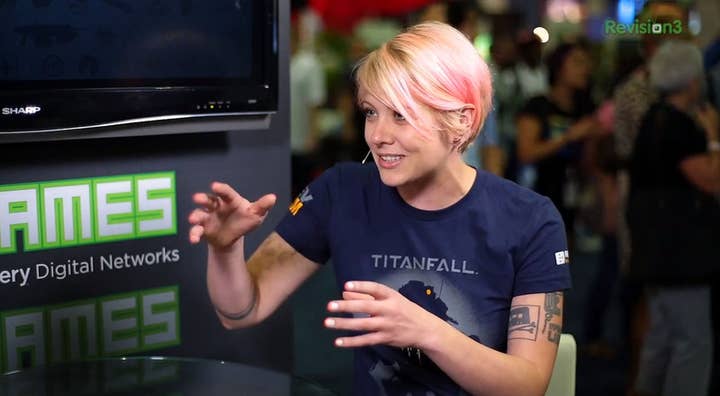Game Journalism: Stepping Stone to PR?
Why do so many journalists jump to the other side, and what does it mean for the industry?
IGN.com executive editor Rich George recently announced he was leaving the site after nearly a decade, much of which was spent as a driving force of the company's coverage for Nintendo consoles. In his IGN farewell blog post, George revealed he was going to work for GolinHarris, the firm Nintendo has long relied upon to handle public relations. This is not to single George out; he's just a particularly recent and high-profile example of a journalist who made the professional jump from covering games to promoting them. The occurrence is now so unremarkable that George didn't feel the need to address any concerns about it in his blog post, and a gaming audience with a seemingly insatiable hunger for scandal seemed to respond with a collective shrug.
But what are the reasons behind this ongoing migration? What's pushing people across the divide, and once there, do they find their new roles match their expectations? GamesIndustry International spoke with a trio of journalists who made the leap to public relations or community management to get their answers to those questions and thoughts on what the trend means for the industry going forward. Each had different motivations for getting out of games journalism, but similar stories as to how they got into it.
What Do You Want To Be When You Grow Up?
Long before Abbie Heppe was the senior games content producer for the now-defunct G4 show X-Play, she was just another writer who went to school for journalism and was making ends meet as a freelancer. She was on Craigslist looking for work when she found a post looking for a game journalist. Between the writing, the games, and the travel, it seemed like a perfect fit that she had never even considered before.
"I don't think I knew there was a place I fit in the industry," Heppe said. "I'd been playing games since I was a little kid but you don't think about what goes into that and where you might fit into that. It wasn't what I was originally looking for. I was looking for writing jobs and trying to figure out what I wanted to do."
As editor-in-chief at IGN, Casey Lynch ran the largest game journalism outlet in the world, but it wasn't something he originally aspired to. He went to college to become a fiction writer, then got a job at the Los Angeles Times out of school hoping to make a career writing about the entertainment industry, music specifically. He soon started writing about games for fun, and although he admits to idolizing some of the professional game journalists he grew up reading, Lynch never intended to follow in their footsteps.
"When I first started, honestly I wasn't thinking that one day I'd be doing that completely professionally," Lynch said.
"A fair amount of the people who get into journalism view it more as a stepping stone to something else, which is very different than a lot of people one or two generations back."
Former game journalist
Former GameSpot reviewer Alex Navarro attributed his entrance into the world of game journalism to a serendipitous overlap of his beloved hobby, his skill set as a writer, and the people he knew. He suspects that lack of intent could be part of the reason so many game journalists have wound up elsewhere in the industry.
"I wonder sometimes if it's a generational thing where a lot of people that got into this line of work came in because it was the thing that made sense to them at the time, not because they really wanted to write about games, necessarily," Navarro said. "I don't know if that's true for everyone and I wouldn't presume to say. But I know that a lot of people who were writing about games when I started, a lot of them have moved on to work in PR, development, or production somewhere."
The reason that trend may be "generational" is that Navarro thinks the people who get into game journalism these days are doing it by design instead of simply falling into it.

"I feel like nowadays there are more and more people that grew up reading people writing about games more regularly than I ever did. So that might not be as much of a trend as more and more people who occupy the space are the ones who very determinedly wanted to do this exact job," Navarro said.
A former long-time journalist who worked at a variety of outlets agreed that people are more deliberate about getting into games journalism specifically, but questioned their motives.
"A fair amount of the people who get into journalism view it more as a stepping stone to something else, which is very different than a lot of people one or two generations back," the former journalist said. "People come into journalism now with an agenda. And it is either to get into development, to go into community, or just to go in-house for something. And there's nothing wrong with going to chase your [goals] and make it all happen. But when you come in with that mindset, the work suffers. Because you worry about doing content that's going to get you hired some place or make a name for yourself so you can leverage that to go someplace else. And it becomes less and less about serving the audience."
Motives for Moving
While some writers may jump into PR or community management, others might feel more like they were pushed. Lynch spent the first decade of his career as an editor and writer-at-large for a slew of outlets. For a single twenty-something freelancer, Lynch said games journalism sounds like a good deal. You're working in the business you love, getting into trade shows, meeting the developers behind your favorite games, and maybe enjoying the odd press junket. "But as time goes on and you get older, cost of living goes up, you get married, have kids, whatever it is, life starts to come into focus," Lynch said. "And you begin to realize that to sustain a certain level of lifestyle with kids, a mortgage, car payments, trying to save for the future and college, you start to see that the road narrows for those types of positions."
"I used to joke with a friend that it was harder to get a good paying gig as a video game writer than it was to get into the NBA."
Casey Lynch
It hasn't helped that the gaming press has hit upon rough times in the past decade. Lynch said magazines and websites were plentiful when he was freelancing, but the industry has since contracted, especially on the print side.
"I used to joke with a friend that it was harder to get a good paying gig as a video game writer than it was to get into the NBA," Lynch said. "And the reason is there are just not that many positions. If you're going to get a job making over $50,000 writing about games--and $50,000 is not a lot of money--you're going to need to go to an established site or magazine. And any of those basically have a masthead of maybe five or 10 people."
So there's a very limited demand for professional game writers, but a nearly limitless supply. When Lynch was at IGN far and away the most frequent question he received was, "How do I get a job at IGN?" As the unnamed former journalist said of most writers today, "There are 7 million other people, at least, that would do your job in a heartbeat. And could possibly do it as good, if not better."
That overabundance of supply has not gone unnoticed by the people running the sites, either. It's part of the reason pay for gaming journalists can be meager, and it's also shifted the content toward cheaper, easier-to-produce stories.

"There is no longer a premium put on editorial by a lot of these larger companies and the management," the former journalist said. "If you're chasing trends, it's more about lists. It's about doing what's popular. It's about being cost-effective. Do you want to have four or five people divvying the work up between daily news and longer features, or do you just get two writers that are maybe half the price and have them cranking out lists or linking other stories? If you're somebody trying to make sure it's profitable and you're looking efficient, you're going to save so much money by just hiring two list kids instead of worrying about the other stuff."
Not every writer who leaves game journalism does it because of complaints about the pay. Navarro said that he left GameSpot because the work environment had deteriorated, with the controversial firing of Jeff Gerstmann the "final straw" that prompted his own departure. After freelancing for a few months, he accepted a public relations and community management position with Rock Band developer Harmonix.
"It's not just about people being buddies and giving each other jobs after years of collusion, or whatever the f*** it is people think goes on behind the scenes."
Alex Navarro
"In my case, when I left GameSpot, I actually took a paycut to go work at Harmonix," Navarro said. "I probably could have made more money just freelancing or finding another full-time job at that time, but because I wanted that gig and it seemed exciting to me, I was willing to take less money to do that."
As for others making the jump, Navarro said the notion that journalists are able to move into PR positions at will is "grossly overstated."
"It's not just about people being buddies and giving each other jobs after years of collusion, or whatever the f*** it is people think goes on behind the scenes," Navarro said. "You have to look at each circumstance individually. It's not this pervasive trend that some people make it out to be. In a lot of cases, it's people who got fed up with their current situation or were out of work and needed something."
Heppe's situation when she left G4 to serve as community manager for upstart developer Respawn Entertainment had nothing to do with finances or unemployment. She balked when asked if money played a role in her decision, saying she was just passionate to work with the studio on its then-unannounced first game (the upcoming shooter TitanFall). Unfortunately, the skill set of a journalist limited the options she had.

"I had always thought it would be great to work on the developer side, obviously, but there aren't that many places where people with my experience fit in on that side," Heppe said. "I'm not a programmer. I'm not a designer."
However, a community management role was a lot more in line with Heppe's previous experience, "sort of a natural extension of a lot of things I had already been doing," she said. And because Respawn encourages its employees to learn and take on added responsibilities as they are able, Heppe has found her duties expanding beyond the community management role she originally took.
The jump from gaming journalism to public relations can be a natural one, especially if writers want to get closer to game development but lack the programming, artistic, or business training that might make such a move feasible. Lynch said there's a lot of overlap between writers and PR people, in that they're both primarily invested in telling stories. Even if it's easy to question the motives behind some of those stories, Lynch stuck up for PR practitioners tarred by some negative perceptions of the field.
"Editorial and PR are sort of intrinsically connected, as much as people want to try and complain about it or convince themselves it's not. It's a symbiotic relationship."
Casey Lynch
"They want to tell stories," Lynch said. "They want to get the truth out in front of the people so those people can make good decisions, so they can be well informed and ultimately, so that they can play great games. Unfortunately when you're doing PR, sometimes that doesn't happen. When you're forced into a position where you're trying to sell a crappy game, that sucks. But I would like to believe that most of the people working in these capacities are doing so with really good intent, for what that's worth...Editorial and PR are sort of intrinsically connected, as much as people want to try and complain about it or convince themselves it's not. It's a symbiotic relationship," Lynch said.
For the anonymous former journalist, the barriers between PR and journalism have grown uncomfortably hazy in recent years. Speaking of writers now collecting a paycheck from the companies they write about, the ex-journo said, "Most, if not all, need to stop fooling themselves into thinking they're doing journalism, because they're not. You cannot be doing journalism if you are essentially working for the company you're writing about. In the end, that sort of unbiased reporting, that freedom to say something against the product, against the company, is not there. In a site, you're driving the ship. At these places, you're coordinating with marketing and PR to get the messaging right."
Regardless of the amount of overlap between journalism and PR, the familiarity people in the former have with the latter might also be spurring some of the interest in switching careers.
"People who have been writing about video games have been, for lack of a better word, getting PR'd for years and years," Lynch said. "So most writers like to fancy themselves as somebody who understands all the wrong ways PR is done and maybe imagines that, having seen it over an extended period of time, they might be able to improve on it."
You Can't Go Home Again, Except When You Can
Of course, as with any new job, not everything goes as expected.
"It sort of shatters some of the ideas you have about how games get made," Heppe explained. "It wasn't like there was a game design document that said, 'This is Titanfall, this is what we're making. Go for it.' It was just built piece by piece. It was a much more organic process. They warned me, 'It's going to look like nothing for a while and then one day you'll see everything come together and it'll be awesome.' And it does sort of happen like that. But when you're press side, a lot of times you don't see things until they're very polished and just what the developer wants to show you. It gives a new perspective on how games are made."
"We're trade press. We're entertainment press. It's not the same thing as a Washington Post journalist becoming a lobbyist somewhere."
Alex Navarro
Navarro said he "kinda didn't entirely understand" what he was getting himself into when he signed on with Harmonix, and learned a lot as he went along, first handling some of the forums work, then writing press releases, and ultimately coordinating the campaign for the PSP version of Rock Band. Despite that progress, Navarro ultimately decided the PR job wasn't a good fit.
"I think the thing I realized over time was I could not do that job for something I wasn't super into," Navarro said. "I don't have the mentality and the desire to promote things unless I am super-duper into it. People ask me if I would ever go back and do PR stuff, and well, it would have to be for a product or a company where I was stoked about what they were doing. I don't think I could do the agency thing where they give me a client and I say, 'OK, I'll find ways to make people like this,' because I can't do that."
Navarro left to write for the film website Screened, and has since moved back to the gaming press with Giant Bomb, a site founded by a handful of his former GameSpot colleagues in the wake of Gerstmann's firing. For his part, Navarro has made a point of not reviewing Harmonix games for Giant Bomb, and avoids reviewing products that could even be considered competitors to his old employer, but from time to time readers still question his credibility as a result of his stint in PR. The issue even extends to the rest of Giant Bomb, as the site's coverage of Harmonix products has at times been questioned, whether or not Navarro had anything to do with the piece in question.
"In the grand scheme of things, it doesn't really mean anything because we know if we're being objective or not. We know where we can be objective, and a few people flaming us doesn't really impact things one way or another," Navarro said. He added, "We're trade press. We're entertainment press. It's not the same thing as a Washington Post journalist becoming a lobbyist somewhere. I'm not saying there's no import to what we do, but we cover an entertainment industry and we get to write about video games. Yes, objectivity and credibility and all these things are important, but we're writing entertainment reviews. And if those people at some point decide they want to stop writing about the games and actually make the games or work on them, I don't feel like that's nearly as wide a gap as some people make it out to be."
"There's something about being a part of the game that's being made and having as much of yourself invested in it and the product. It makes me happier to be a part of that than to critique it from the outside."
Abbie Heppe
Unlike Navarro, Heppe has stuck with her new career, and couldn't envision a situation where she'd return to game journalism.
"I might feel like I cheated [if I went back] because you get a really good perspective on a lot of stuff," she joked. "But no, I really, really enjoy this side. There's something about being a part of the game that's being made and having as much of yourself invested in it and the product. It makes me happier to be a part of that than to critique it from the outside."
Lynch also enjoyed his time in the PR world, and said he hadn't been looking to get back into gaming journalism when the possibility of running IGN came up. However, he said the opportunity was "too good to pass up." And Lynch agreed with Heppe that the added perspective of having worked on the other side of the fence was invaluable when he went back to the gaming press.
"I think it gave me an incredibly different breadth of knowledge, experience, and insight as a journalist moving into a new field and then moving back into journalism," Lynch said. "I would honestly recommend it to anybody. People can complain and moan about PR people all day long, but if they went and did that job for a couple years, I think they would see things a little differently."
Despite the benefits granted from that experience, it still wasn't enough to keep Lynch from leaving game journalism for a second time. This summer, Lynch left IGN to help set up Midnight City, a new indie publishing label backed by Majesco Entertainment. At this point, he doesn't foresee going back to either game journalism or PR in any sort of compartmentalized way, saying he gets to do elements of both in his current role as the label's VP of publishing.
"For better or for worse, the window of time that somebody with a gaming journalism background was viewed as having a unique skill set has closed."
Former game journalist
"We have the games. We have the content that people want to talk about and create content around. And we can do that ourselves," Lynch explained. "And I think that's what more and more publishers will be doing as time goes on. People are realizing, 'Hey, I have a huge network of people we can tap into, whether it's on Twitter, Facebook, or YouTube.' We've got the games these media people want to talk about, but we can just talk about them ourselves."
Lynch believes the "top-tier" outlets will always have a voice, but if, as he suggests, publishers can communicate straight to the receptive masses without having to worry about press mucking up the messaging, what incentive is there to involve game journalists at all? The anonymous ex-journalist said the rise of social media and publishers' direct access to their audience has put the press in a precarious position. Outlets have always fought over exclusives, but now they're also having to compete against the publishers' own channels for those assets. That gives publishers tremendous influence over the type of content produced, and the content they are most interested in happens to look a lot like PR.
"From a career path standpoint, there's nowhere to go," the ex-journalist said. "Journalism has quickly become a dead end. It's dying. The stuff journalists did just a couple years ago is no longer viewed as an important part of a business model. For better or for worse, the window of time that somebody with a gaming journalism background was viewed as having a unique skill set has closed."









